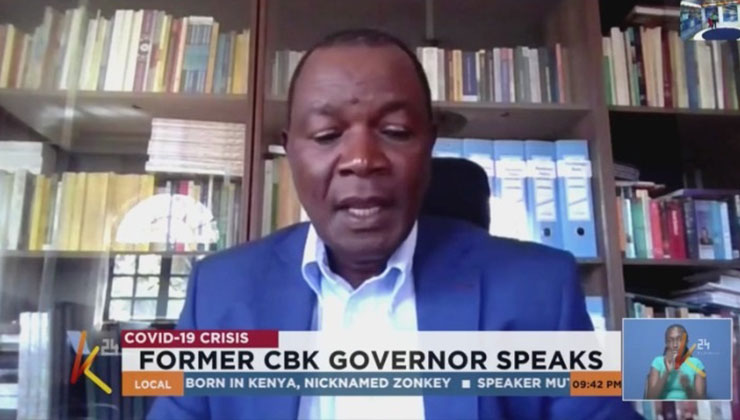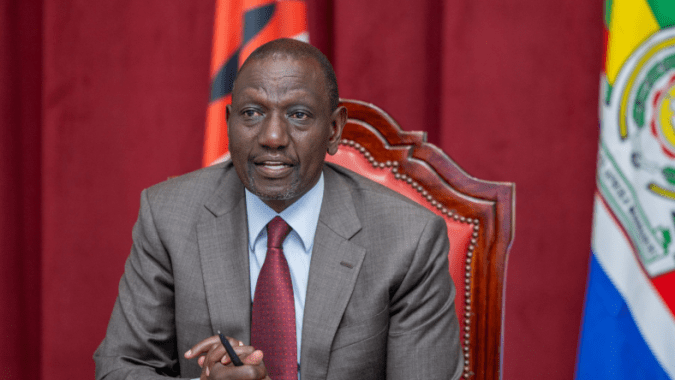Covid-19 hit Kenya economy at its weakest point, ex-CBK boss Ndung’u says

Amid dwindling economic fortunes on the back of the Covid-19 pandemic, Kenya’s economy has been hit.
To put this in perspective and suggest solutions to Kenya’s quagmire, K24 TV Punchline host Anne Kiguta spoke to former Central Bank of Kenya (CBK) governor Njuguna Ndung’u.
Excerpts:
Question: Where was the economy when President Uhuru Kenyatta began his second term, and where is it now, in the middle of this pandemic?
Answer: It is difficult not to notice policy failure driven by severe institutional problems and governance challenges.
From 2013 there was a devolved government – with no firm foundation and respect for Public Financial Management Legal framework.
This perhaps was the start and acceleration of an institutional failure problem. The pandemic comes at a time the Kenya economy is at its weakest point.
I like being positive, but it is difficult to make any other assessment, due to several factors.
The devolved government has failed to deliver to Kenyans, it instead institutionalized corruption.
Other institutional failures, problems followed – widespread national looting became a culture.
Recession, which set in in 2016, was triggered by national and county governments’ failure to pay suppliers and contractors.
This had three effects – constrained liquidity in the economy, the collapse of the retail trade and the collapse of the SMEs sub-sector.
Interest rate capping, in the mistaken believe – and ignoring advice – that it would support small borrowers and SMEs – robbed the country in the range of 0.75 per cent to three per cent of economic growth from recent papers published in high-level journals.
Then there was the turbulence in the banking sector in 2016/17, coupled with youth unemployment and the Desert Locust invasion.
The government failed to protect the market in the real sectors, particularly agriculture.
The pandemic has thus found the Kenyan economy in a very weak position. But Kenya has some peculiar advantages.
It is stronger than other countries in coping strategies due to advancement in the digital space namely digital finance, retail electronic payments system, e-Government and e-commerce – this can be used to resolve several challenges including targeted social protection programmes.
Question: Is there a way the economy would have been better placed to handle what is currently happening?
Kenya’s success story is playing out in virtual or digital payments. It is time the government widens its targeted social protection radar to reach the needy.
There is no economy in the world that would have been ready to handle the effects of a global pandemic.
What we do know is that the whole world is looking for permanent solutions but at the same time coping to prevent loss of life.
The first short-run solution is to help the market to cope and not to panic.
Most administrative structures can cause panic. Define the timeline and the broad objectives.
What is the impact of the nationwide curfew and partial Nairobi, Mombasa, Kwale and Kilifi lockdown on the economy?
Inter-county trade is halted and Nairobi still carries the largest share of economic activity and contribution to gross domestic product (GDP), followed by Mombasa.
Most urban poor must work in order to have a meal that day. So a lockdown must come up with interventions for such people.
The CBK estimates that the coronavirus crisis may cut economic growth by nearly half to 3.4 per cent while others have suggested a range of 4.3 per cent to 5.2 per cent. What do you think will be the impact on growth?
It will be difficult to predict the effects of a global persistent negative shock.
At times we need to take cognizance of the initial conditions.
The Pandemic found Kenya already speeding downhill for factors that should have been contained.
In that case the pandemic does not halt the declining economic performance but accelerates it downwards.
We have to brace ourselves for a protracted recession. Luckily this will also be global.
What scenarios are you watching as an economic indicator for how 2020 will end?
So far, the indicators for 2020 are pretty gloomy. The economic indicators are overshadowed by social ones.
But the true position from the fiscal side, monetary policy side or even growth profile can only be assessed once the pandemic is halted, not only in Kenya but also worldwide.
But we may not see the severe economic contraction of the 2000 to 2002.
What are the top three interventions that you think President Kenyatta should make to stop the economy from going into free fall?
The President needs to seek advice from professionals whose interest is positive national and inclusive development.
Suppliers and contractors need to be paid to keep them afloat and save jobs.
The IMF Regional Economic Outlook launched in November 2019 had and interesting title; Navigating Uncertainty: government debt to suppliers, contractors and pending bills – to the private sector, stood at 0.6 per cent of GDP.
Because of this, private sector debt to other private sector players stood at 1.2 per cent of GDP.
These two components then are mapped to banking sector non-performing loans (NPLs) to the tune of 0.8 per cent of GDP.
Any government in the world would be scared of the consequences.
For the urban poor, interventions should be directed to utilities like water and power, oil, gas and paraffin. Then to essentials like food.
Who will be the beneficiaries of the Corona Economy?
Several sectors will benefit from this pandemic directly and indirectly: the pharmaceutical industry and health care services, online entertainment, online learning, IT solutions, e-commerce, digital banking and retail electronic payments system.
What can we do for our economy going forward?
I continue to advocate domestic policy environment that allows for inclusive market development. The success of our digital space and virtual financial services are such visible examples.
It is time we start developing disruptive solutions to our economy.
First, we have to sort out institutional failure that has pushed governance in Kenya to its lowest level.
Second, we must utilise our relative comparative expertise across counties. Revive the agricultural sectors.
Third, reform the tax policies – taxation should be an incentive to producers and consumers at the present economic management age.
The success of tax policy and taxation in general will drive the positive fiscal space that we all desire. Lastly, let us stick selflessly to the Vision 2030.
We can make amends along the way due to changing circumstances and dynamics.













